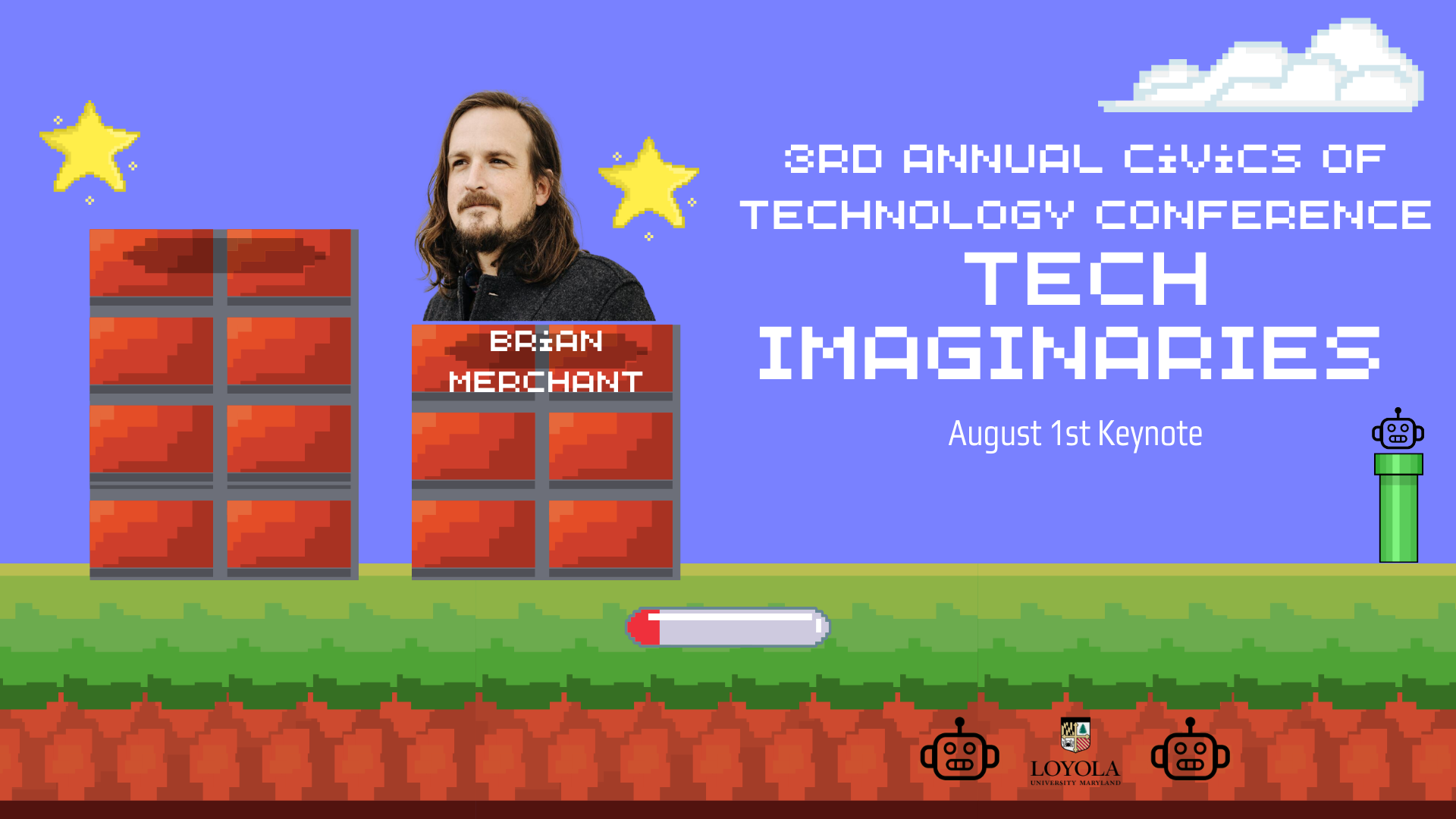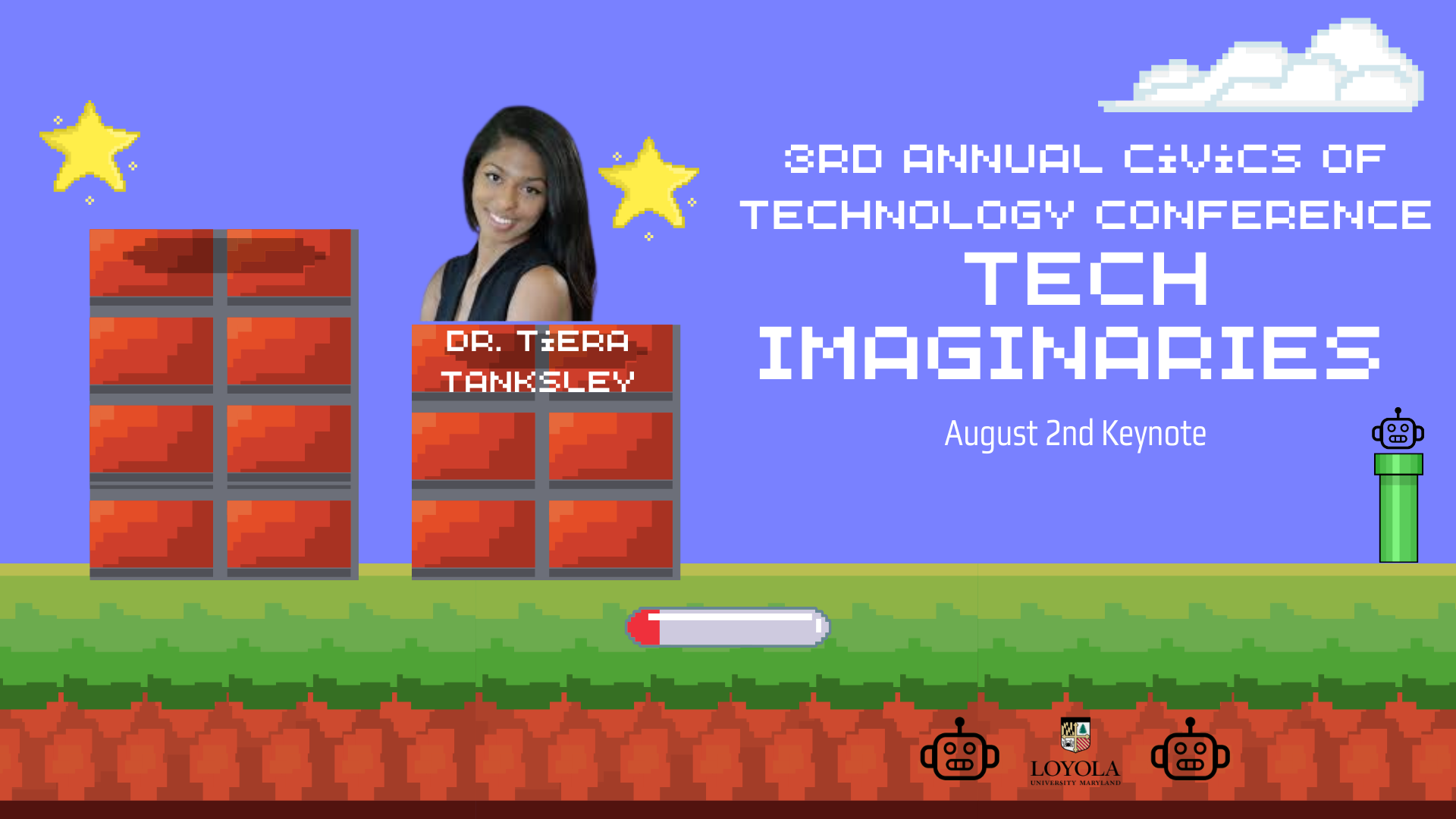Tech Imaginaries
Join us for our 3rd Annual Civics of Technology Online Conference be held online on August 1st, from 11-4 pm EST and on August 2nd, 2024 from 11-3pm!
Conference Theme: Tech Imaginaries
The third annual conference theme is Tech Imaginaries. Our themes the last two years have been Visioning Just Futures (Year 1) and Liberatory Tech Actions (Year 2), and this year we'd like to turn toward surfacing, confronting, and playing with how imagination works to create tech futures. This theme builds on our project motto, “Technologies are not neutral and neither are the societies into which they are introduced.”
We were inspired, as we often are, by Dr. Ruha Benjamin’s new book, Imagination: A Manifesto. We just read her book for our April Book Club and were struck by the ways she frames imaginaries. Playing with the notion of imaginaries, she writes:
I want more than anything for your imagination to run wild. In that spirit, my use of the word is undisciplined, promiscuous, and porous. … I go back and forth between imagination and imaginaries--conceptual kin, related but not identical. Although a bit jargony as a noun, imaginary refers to collective projections of a desirable and feasible future. I find myself invoking imaginaries when I want to cast a critical light on the imposition of a dominant imagination that presents itself as appealing and universal. You’ll see, too, that I refer to imagination interchangeable with dreams and dreaming, ideas and ideologies. I invoke stories and speculation as surrogates, playing and poetry as proxies, and myths, visions, and narratives all as riffs on the imagination.
In most cases, I am implying the idea of a collective imagination, as when we imagine different worlds together, writing shared stories and plotting futures in which we can all flourish. But this “collecting” of our imaginations is not always a good thing, as when the powers that be endeavor to download their dreams from on high. We must learn to protest our imaginations.(pp. ix-x)
In her book, Dr. Benjamin shows how the imaginations of Silicon Valley CEOs often create worlds we don’t want to live in, and thus emphasizes the importance of imagining the just futures we desire. Similarly, our keynote speakers have invested their time and thinking in imagining alternate technological futures, and we hope it will also inspire your submissions to our conference!
Keynote Speakers
We are delighted to share our featured keynotes are Dr. Tiera Tanksley and Mr. Brian Merchant. We would like to thank Loyola University Maryland School of Education’s Center for Equity, Leadership, and Social Justice in Education for sponsoring our keynotes.
Mr. Brian Merchant is a tech journalist and award winning and best selling author of Blood in the Machine and The One Device. His work examines technology, work, climate change, utopian dreams and dystopian realities and the things that lie in between.
Dr. Tiera Tanksley is an Op Ed Public Voices Fellow for Technology in the Public Interest with the MacArthur Foundation and Post-doctoral Fellow for Youth, Technology, and Public Policy at UCLA. Her work simultaneously recognizes Black youth as digital activists and civic agitators, and examines the complex ways they subvert, resist and rewrite racially biased technologies.
Conference Norms
Please be patient listeners, understanding that our positionalities in relation to power influence our interactions, and recognize that impact matters more than intent. Attendees should respect the preferences and dignity of fellow conference participants, including at the conference. Please use pronouns if listed and respect the social media sharing preferences of presenters. Our conference also aims to be accessible and all sessions should turn on the option to “show captions.” Moreover, we hope participants will commit to advancing more just futures. Please contact Dan or Marie or use our contact form if you have any problems or concerns during the conference.
Day 1 — Thursday, August 1st
11:00-11:15am EST
-
Room 1
Welcome & Introduction to the Conference
Dan Krutka & Marie Heath
Day 1 Keynote | 11:20-12:20pm EST
-

Room 1
Day 1 Keynote
Mr. Brian Merchant
12:25-12:50pm EST
-
Room 1
What’s the point of a thesis anyway? Reimagining the masters thesis in light of AI disruptions
Heidi Reed
-
Room 2
Degrowth in Postdigital Learning Design
Kate Molloy
-
Room 3
Conjuring Digital Doppelgangers in EdTech
Aaron Aguilar
1:00-1:50pm EST
-
Room 1
Data Justice Lightning Talks
Claudia Scholz & Data Justice Academy Alumni
-
Room 2
Classroom Dialogues on Tech Imaginaries
Frank Vloet
-
Room 3
Things you should read, hear, and see: Sharing resources for our tech imaginaries
Jacob Pleasants
2:00-2:50pm EST
-
Room 1
/thecalmcode
Camille Iman Woods
-
Room 2
Just Futures through Technoskeptical EdTech in Social Studies and Digital Citizenship
Micah Miner
-
Room 3
Re-Imagining Ed Tech Research
Natalie Milman
Sumreen Asim
3:00-3:50pm EST
-
Room 1
Fostering Tech Imagination in the Humanities Classroom
Allie Thrall, Christine Derbyshire, Paige Arnell, & Phil Nichols
-
Room 2
Seeding Visions of Algorithmic Justice in K12 Ethnic Studies Classrooms
Mila Re & Mark Gomez
-
Room 3
Writing (Auto)Correctly: Thinking Technoskeptically about AI-Powered Writing Tools
Jeffrey Radloff
Day 2 — Friday, August 2nd
Day 2 Keynote | 11:00-12:00pm EST
-

Room 1
Day 2 Keynote | 11:00-12:00pm
Dr. Tiera Tanksley
12:05-12:30pm EST
-
Room 1
High School AI Classrooms: Look Before You Leap
Erin Levin
-
Room 2
Smart Campus Imaginaries and Surveillance
Elma Hajric
-
Room 3
Promoting Equitable Teaching Practices through TACTivities: A Case in Teaching Statistics
Cindy York
Angie Hodge-Zickerman
Liza Bondurant -
Room 4
Data Justice Lightning Talks
Claudia Scholz & Data Justice Academy Alumni
12:30-12:55pm EST
-
Room 1
Technology, Innovation, Education, and the Bandwagon of Design: Is This Really the Best We Have?
Jason McDonald
-
Room 2
Imagining Tech Futures: A Dialogue on Domestic Posthumanism and Digital Habitus
Dennis Weiss & Colbey Reid Alberto Romele
-
Room 3
AI is Anti-Black. What can Educators do about this?
Sharla Berry
1:00-1:50pm EST
-
Room 1
Superheros and Villians of Learning Design: A Disasterclass
Eamon Costello, Jason McDonald, & Irina Grigorescu
-
Room 2
Uncovering GenAI-related imaginaries
Tessa Consoli & Roland Fischer
-
Room 3
Imagined Futures of Higher Education: A Decade of Trends from the Horizon Report
Bruna Damiana Heinsfeld, Angelica Pazurek, & Cassie Scharber
2:00-2:50pm EST
-
Room 1
Critical Media Literacy #MisinfoDay with Youth and Community
Jennifer Elemen, Liz Crouse, & Mark Gomez
-
Room 2
Resisting as Part of our Tech Imaginaries
Andrew Doyle, Catharyn Shelton, Charles Logan, Marta Estellés
-
Room 3
Where are the equitable computer science practices in integrated K-8 curricula?
Erin Anderson
Call for Proposals (Closed)
We seek proposals that advance the conference theme of Tech Imaginaries. This may include proposals which seek to…
dream of the just futures we need for our students, educators, and communities;
uncover the hidden or unintended imagination behind the technology that pervades human lives—past, present, and future;
confront the oppressive ideologies that undergird much of the emerging tech coming out of Silicon Valley today;
identify and make explicit how imagination undergirds the work you’re already doing!